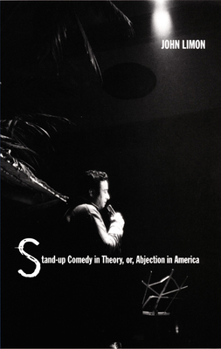Stand-up Comedy in Theory, or, Abjection in America (New Americanists)
Stand-Up Comedy in Theory, or, Abjection in America is the first study of stand-up comedy as a form of art. John Limon appreciates and analyzes the specific practice of stand-up itself, moving beyond theories of the joke, of the comic, and of comedy in general to read stand-up through the lens of literary and cultural theory. Limon argues that stand-up is an artform best defined by its fascination with the abject, Julia Kristeva's term for those aspects of oneself that are obnoxious to one's sense of identity but that are nevertheless--like blood, feces, or urine--impossible to jettison once and for all. All of a comedian's life, Limon asserts, is abject in this sense.
Limon begins with stand-up comics in the 1950s and 1960s--Lenny Bruce, Carl Reiner, Mel Brooks, Mike Nichols, Elaine May--when the norm of the profession was the Jewish, male, heterosexual comedian. He then moves toward the present with analyses of David Letterman, Richard Pryor, Ellen DeGeneres, and Paula Poundstone. Limon incorporates feminist, race, and queer theories to argue that the "comedification" of America--stand-up comedy's escape from its narrow origins--involves the repossession by black, female, queer, and Protestant comedians of what was black, female, queer, yet suburbanizing in Jewish, male, heterosexual comedy. Limon's formal definition of stand-up as abject art thus hinges on his claim that the great American comedians of the 1950s and 1960s located their comedy at the place (which would have been conceived in 1960 as a location between New York City or Chicago and their suburbs) where body is thrown off for the mind and materiality is thrown off for abstraction--at the place, that is, where American abjection has always found its home.
Limon begins with stand-up comics in the 1950s and 1960s--Lenny Bruce, Carl Reiner, Mel Brooks, Mike Nichols, Elaine May--when the norm of the profession was the Jewish, male, heterosexual comedian. He then moves toward the present with analyses of David Letterman, Richard Pryor, Ellen DeGeneres, and Paula Poundstone. Limon incorporates feminist, race, and queer theories to argue that the "comedification" of America--stand-up comedy's escape from its narrow origins--involves the repossession by black, female, queer, and Protestant comedians of what was black, female, queer, yet suburbanizing in Jewish, male, heterosexual comedy. Limon's formal definition of stand-up as abject art thus hinges on his claim that the great American comedians of the 1950s and 1960s located their comedy at the place (which would have been conceived in 1960 as a location between New York City or Chicago and their suburbs) where body is thrown off for the mind and materiality is thrown off for abstraction--at the place, that is, where American abjection has always found its home.
Format:Paperback
Language:English
ISBN:0822325462
ISBN13:9780822325468
Release Date:June 2000
Publisher:Duke University Press
Length:160 Pages
Weight:0.64 lbs.
Dimensions:0.5" x 5.8" x 9.2"
Customer Reviews
3 ratings
How deep does the comedy rabbit-hole go?
Published by Thriftbooks.com User , 15 years ago
I am blown away by the depth of the author's analysis and the deep reading he has done of American Stand-Up Comedy as American cultural history. Of all the books analyzing comedy, and there are some very good ones, this one takes it the farthest. The language used is highly academic and consistently difficult to read. But the hypotheses and conclusions derived are no less short of brilliant. It is worth reading and re-reading to pull the wisdom from whence Stand Up Comedy has crossed, oftentimes trampled, Mass Culture. It is a short yet very dense collection of 6 essays, each examining a critical and formative piece of Stand-Up 'Americaine.' The content may be better served by watering down the academic language. Yet for someone willing to truly understand why Stand Up is so amazing and stimulating and culturally profound and necessary, this book is unequaled. It will expand your vocabulary in the process. My hat goes off to this author. Jay Tomatoes
Extremely Well Thought out Book of Essays
Published by Thriftbooks.com User , 20 years ago
Beyond John Limon's well-constructed prose, he has a great understanding of his subject matter. I found his thesis for this book of essays fascinating--a cultural connection of Jewish heterosexual males comics of the 1960s (though I believe Bruce experimented sexually), and the pushing of the comedic form as it has influenced the evolution of comedy/satire of today. His essays on Lenny Bruce and Nichols and May are some of the best writing on these comic/social satirists in print, and great reason to buy this book. His analysis of Elaine May's subtle character work I found extremely insightful, and proved her impact in this male dominated world of humor in the 50s and 60s; she has influenced many through the years, yet is rarely applauded in recent years for she her brilliance and contribution.
BRILLIANT BOOK!
Published by Thriftbooks.com User , 21 years ago
There are no words to describe how fantastically astute this book is. John Limon is diabolically intelligent.





